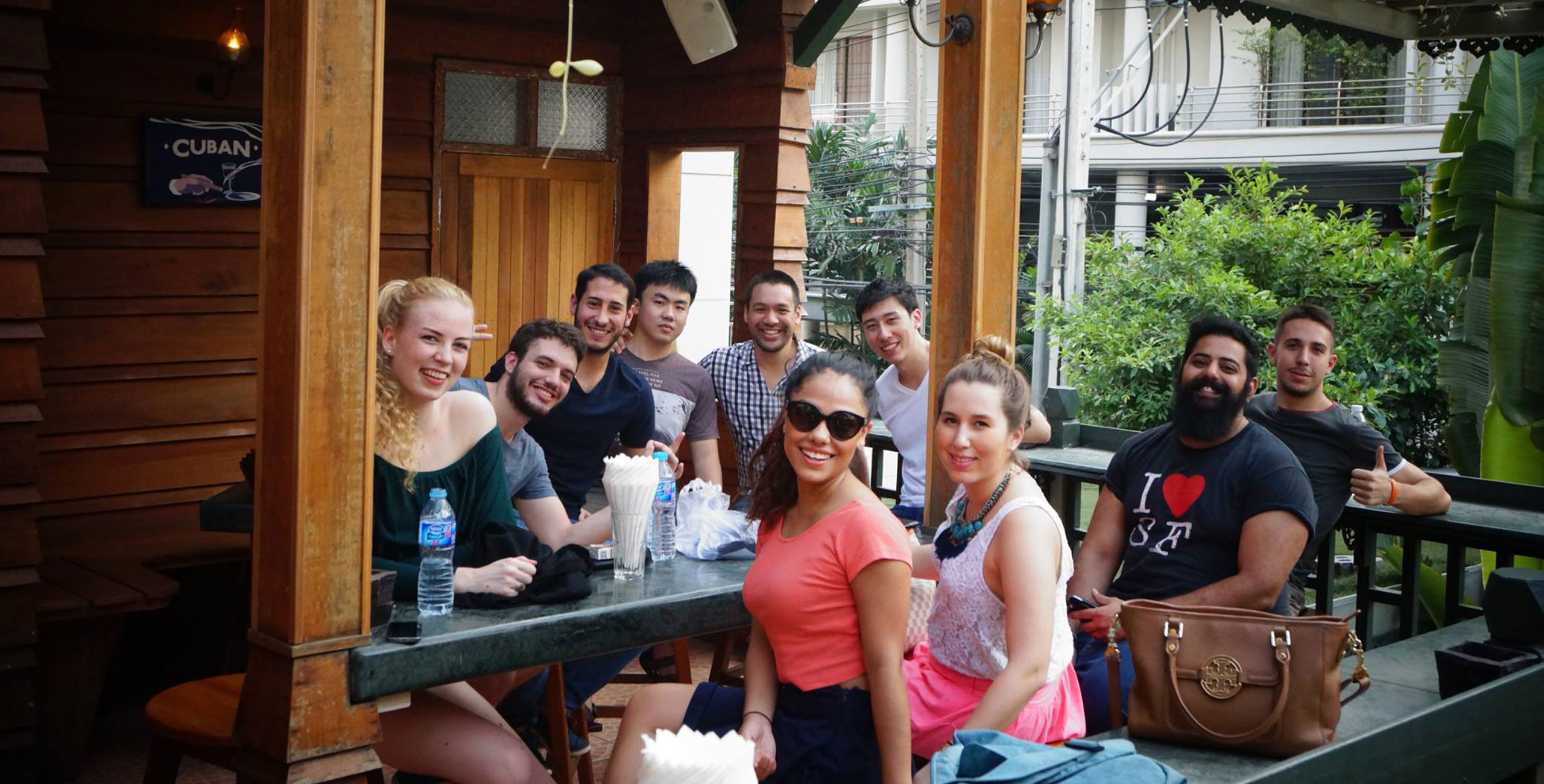Some of the people I know who have the coolest jobs, and many times ones they are conventionally “unqualified” for, are the ones who were interns first. Ahem, unpaid interns, who stuck their foot in the door, proved themselves, and leveraged that experience to jump-start their careers.
One of my friends started as an unpaid intern at CNN and a few years later, she’s a wildly successful Associate Producer. Another friend was working in a neuropsychology lab at NYU and wanted to transition into the start-up scene and go to business school. Her only option in the competitive New York market was to network her way into the same room with the CEO of a company she admired and pitch the woman on why she should work for her, even if it was unpaid. She succeeded, and after years running virtually all aspects of the business as an intern and then a paid intern and later a Relationship Manager, is off to get her MBA.
 Another friend with no experience in the fashion world took an unpaid internship at one design house and after a year, gained enough firsthand know-how to design the new young men’s line at another huge brand (paid, very paid). An even more ballsy example, a client of mine with a degree in International Relations sent a cheeky email (or five) to the director of Sephora in London, sent him free ideas, and wound up landing a creative advertising role. Unpaid, but it allowed her to transition into the business world.
Another friend with no experience in the fashion world took an unpaid internship at one design house and after a year, gained enough firsthand know-how to design the new young men’s line at another huge brand (paid, very paid). An even more ballsy example, a client of mine with a degree in International Relations sent a cheeky email (or five) to the director of Sephora in London, sent him free ideas, and wound up landing a creative advertising role. Unpaid, but it allowed her to transition into the business world.
I myself did unpaid internships in non-profit management in both Guatemala and Egypt during university, albeit I hustled to score university-sponsored research and academic fellowships to foot the bill. The experience I gained abroad fleshed out my degree in International Studies and provided skills I later leveraged to land a prestigious management consulting gig that I otherwise was definitely not qualified for.
I think many fresh graduates or current students consider themselves too proud to work without pay (or not in a position for it to be financially feasible, which is understandable), but their long-term careers may actually benefit from humbling themselves to a period of mentorship, learning, and ruthless resume-building. While many popular outlets from Forbes to US News have argued against forgoing a paycheck for the sake of experience, I argue for it, as long as we apply certain conditions. These conditions involve doing your homework to ensure a fair exchange is on the table.
First, only accept an unpaid position if you’ve been searching for paid and full-time positions in your industry for a minimum of three months with no luck, or if you’re transitioning into a field that you’re absolutely desperate to break into. If you’ve been struggling in the competitive market, take time to evaluate why you’re not getting hired, mercilessly pinpoint your weaknesses, and then make sure that the unpaid position will concretely address those gaps. You want this to be your first and last time going unpaid for the work you really want to do.
 Another good reason to take an unpaid internship is if it’s something you’ve managed to create for yourself, let’s say at a big brand name company or sexy start-up that isn’t hiring and doesn’t offer paid internships, but you met the CEO or HR director and pitched yourself and they agreed to take you on. That foot in the door is probably worth it and an opportunity you most likely won’t get otherwise.
Another good reason to take an unpaid internship is if it’s something you’ve managed to create for yourself, let’s say at a big brand name company or sexy start-up that isn’t hiring and doesn’t offer paid internships, but you met the CEO or HR director and pitched yourself and they agreed to take you on. That foot in the door is probably worth it and an opportunity you most likely won’t get otherwise.
Here’s a few more details you want to pay attention to when conceding to do unpaid work:
- Make sure there are clear expectations, and get it on paper. Many unpaid interns wind up overworked and taken advantage of, or simply making copies and getting coffee when they thought they would be designing, presenting, and actively learning. Identify the tasks you’ll be responsible for during your internship, and if possible, agree on at least one major project you’ll complete so you’ll have a concrete deliverable to add to your portfolio.
- Clarify how much opportunity will you have to work with the boss or the mentor you admire. You want access to the people you’ll learn the most from. You should perform outstandingly well during your internship, but in order for it to be meaningful, the ones in charge need to see you doing so.
- Look at the company track record. Have they had interns, paid or unpaid, in the past? How did they treat them? Where did those people wind up afterwards? How long was the typical arrangement for?
- Look at market trends. As the aforementioned Forbes article correctly points out, many industries that offer unpaid internships are unable to employ you because they just aren’t performing well overall. Is this an industry you want to invest your time and energy in? If the industry shows signs of failing, like media and advertising for example, are the skills you’re gaining in this internship able to be transitioned into another field you’d also consider pursuing?
- Plan your finances. Take a cold hard look at your bank account and make sure going several months without pay is feasible. The last thing you want is to back out at an inconvenient moment when you realize you can’t pay your bills. This is where having clear expectations comes in: Is it a 30 day trial period and then evaluation for being put on payroll? 60 days? Avoid agreeing to an indefinite unpaid internship at all costs.
Above all else, seize the opportunity to demonstrate your potential in the right environment, to the right audience, and under the right conditions, but don’t fall into the perpetual internship trap. You want to take an unpaid opportunity no more than once, and it’s best if it occurs during or immediately after university, or at a critical point of career pivoting when you really don’t have the conventional qualifications (and after repeated trials to be hired full-time by spinning your existing skills in new ways). If you’re considering a second or, heaven forbid, third unpaid internship, you need to re-evaluate how you’re positioning yourself on the job market and entirely change strategies so you’re able to land full-time positions again.

Prior to accepting any unpaid position, opportunities for full-time work and advancement must be at the forefront of the conversation. What tasks will you be responsible for as intern? At what point will you be evaluated for becoming a full-time employee? What are the criteria for evaluation? What kind of roles will you be eligible for with the skills gained through the internship? How will feedback be provided and how often? By whom? Again, get this all in writing. By making it clear at the onset that you are looking to use the position as an entry point into a long-term role, you set the tone for the seriousness of the internship and increase your chances of being hired afterward.
If you’re able to successfully navigate these initial conversations and set up an internship that bolsters your skill set, expands your network, and adds a prestigious brand name to your resume, then, in my opinion and experience, the exposure is worth the sacrifice and may just result in the serious career upgrade you need.
Struggling to find the right internship placement? Check out the 50+ Professional Internships, Volunteer Projects and TEFL Programmes that Global Nomadic offers in 30 countries worldwide. Travel your career – apply today!
 A former NYC management consultant turned legal nomad, Elaina Giolando writes about the intersection of career, life, and travel for today’s 20-somethings. She currently works as an international media representative, traveling to a new country every 3 months to live and work. In her spare time, she focuses on providing her peers inspiration to proactively create rewarding and unconventional lifestyles. Follow Elaina on her blog Life Before 30 or @_LifeBefore30.
A former NYC management consultant turned legal nomad, Elaina Giolando writes about the intersection of career, life, and travel for today’s 20-somethings. She currently works as an international media representative, traveling to a new country every 3 months to live and work. In her spare time, she focuses on providing her peers inspiration to proactively create rewarding and unconventional lifestyles. Follow Elaina on her blog Life Before 30 or @_LifeBefore30.











